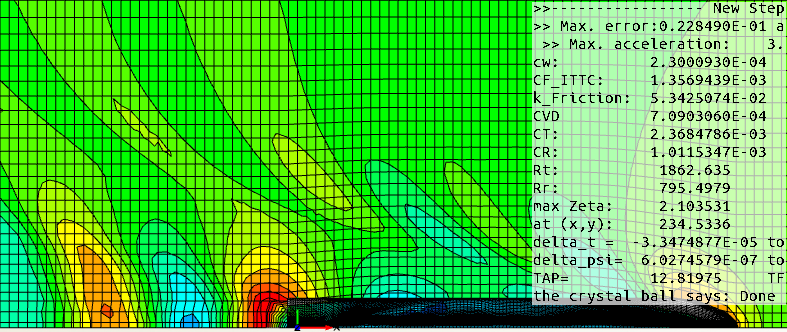General Information
Modules
Winter Semester
- Ship Design (M.Sc.)
- Damage Stability of Ships (M.Sc.)
- Computer-aided Design and IT in Ship Design ,Production and Operation (M.Sc.)
- Team Project EMship (M.Sc.)
Summer Semester
- Basic of Ship Technology (B.Sc.)
- Resistance and Propulsion (M.Sc.)
- Lab in Naval Architecture and Ocean Engineering (B.Sc.)
Offers to students
Downloads
Course: Resistance and Propulsion
Master Naval Architecture and Ocean Engineering
In this module, students will learn the physical fundamentals of ships resistance in a two-phase flow as well as to evaluate the thrust generation by a variety of propulsion organs with a focus on propellers. By gaining knowledge about the effective principles of propellers and the interaction with ship hull and the machineries, students are enabled to develop and assess propulsion concept. Competences are obtained to work interdisciplinary with experts from related fields such as hydrodynamic ship hull optimization, propeller development and ship main machineries in order to optimize the propulsion system under given boundaries. In addition, students will be qualified to interpret results from CFD calculations and rate enhancement measures of propulsions.
- Repetition of fundamentals of fluid dynamics, boundary layer
- Resistance: friction-, pressure caused
- Wave energy
- Similarity law
- Method to extrapolate experimental data: Froude, Form-Factor-Method, ITTC
- Influence of ship parameters on ship resistance
- Downstream: reasons, distribution, effects, scale effects
- Suction: reasons, impact on propulsion efficiency, scale effects
- Propeller, -parameter, theory, propeller design, -optimization
- Interaction between ship - propeller- maschinaries.
- Measures to increase propulsion efficiency
The following topics will be covered in the seminars accompanying the lectures:
- Fundamentals of ship drag/power prediction, proportions, similarity laws
- Resistance and propulsion power estimation in design according to different prediction methods
- CFD based wave resistance prediction as basis for ship hull form evaluation
- Propeller design according to different optimization criteria
- Wake: propeller inflow in the wake field
- Model tests and transfer of results to full-scale: performance prediction
After consultation with the students, seminars are held on individual topics, which take several hours due to the complexity or the tools to be used.
- Anthony F. Molland et al. Ship resistance and propulsion: practical estimation of ship propulsive power, Cambridge Univ. Press, 2011, URO-Bib Signatur: ZO 6220 M726
- Joseph H. Spurk Strömungslehre, Einführung in die Theorie der Strömungen, Springer Verlag, Berlin, 1996
- K. Wieghardt Theoretische Strömungslehre, B.C. Teubner Verlagsgesellschaft, 1965
- H. Schneekluth Hydromechanik zum Schiffsentwurf, Koehler Verlag, Herford, 1985
- Edward V. Lewis, Editor Principles of Naval Architecture, Volume II und III, The Society of Naval Architects and Marine Engineers, New Jersey, 1988
- H.E. Saunders Hydrodynamics in Ship Design, Volume 1 und 2 J. Brix, Editor Manoeuvring Technical Manual, Seehafen Verlag, Hamburg,1993
- H. Schneekluth, V. Bertran Ship Design for Efficiency and Economy, Butterworth-Heinemann, Oxford,1998
- F. Mewis Zum Einfluß des Formfaktors k auf die berechnete Leistung, Schiffbauforschung 28, Seite 99 ff, 1989
- Autorenteam Propulsion von Schiffen, 20. Fortbildungskurs am Institut für Schiffbau, Hamburg, 1984
- J.S. Carlton Marine Propellers & Propulsion, Butterworth-Heinemann, Oxford, 1994
This course is an elective module of the Master in Naval Architecture and Ocean Engineering.
The knowledge imparted in the module is assumed as basic prior knowledge in the other specialization modules of the program, which include:
- Ship Design
- Ship theory I and II
- Propeller theory
- Ship safety
- Numerical fluid mechanics


